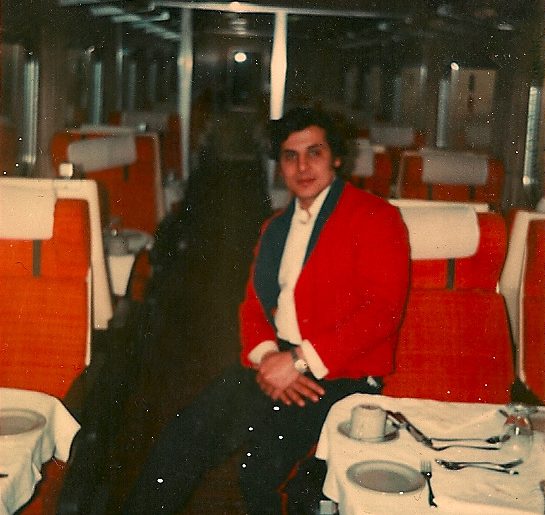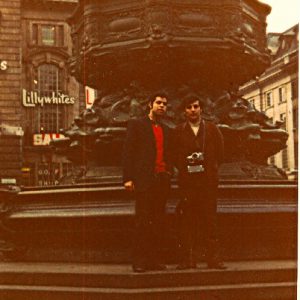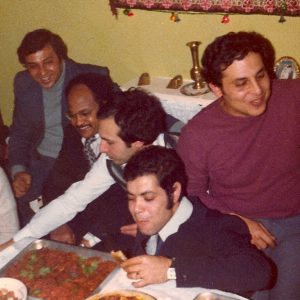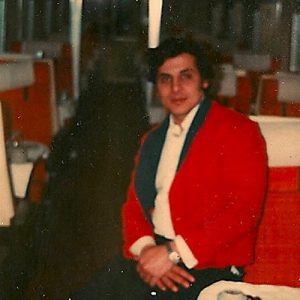It’s interesting how you may know fragments of your parents’ pasts but rarely know the details or the story as a whole. It wasn’t until joining the Everyday Muslim project that I began to question my father about his journey to England back in 1970; his first impressions, his first encounters and his struggle of trying to live in a society that was often hostile.
My father left Cairo in late August, stopping off in Paris before arriving at Heathrow Airport. He had arrived at night and was desperately tired and a little bit disorientated. He remembers being surprised to see it was still light outside despite it being after 9pm. He had only $5 with him at the time and didn’t think of changing them into Sterling before he boarded a bus (there was no Piccadilly Line serving the Heathrow terminals at the time). The bus conductor allowed him on regardless. When he hopped off the bus at South Kensington to get the tube to Euston he was faced again with the problem of not having the right currency to pay for his fare. Luckily enough a kind Caribbean gentleman overheard and paid for my father’s ticket.
My father had come to England in the hope of pursuing his studies. But soon the burden of rent and bills took its toll and my father began searching for employment. He had earned a Bachelors degree from Cairo University, graduated one of the top in his class and had subsequently worked within different government departments. However at a time when prejudice and discrimination was still rife his qualifications and experience meant nothing in the UK and he resorted to searching for employment amidst the small Egyptian community. A large majority of these Egyptians were at the time working within the catering and services industry across Britain and it was through the network of fellow countrymen that my father managed to get a job doing casual work in different hotels and then working full time for several years on the First Class restaurant car on the British Rail.
Life has a way of making demands that sometimes make you loose track of what you had planned to do but my father says he enjoyed working on the railways as it gave him the opportunity to travel across the UK, something he wouldn’t have necessarily been able to do had he remained a student. After his stint on the railways he worked again in hotels such as the Dorchester and Intercontinental on Park Lane and the Gleneagles Hotel in Scotland serving famous people such as the singer Lulu, the former British Prime Minister Edward Heath and Elizabeth Craig, who apparently was the big name in cooking at the time before Delia Smith and Jamie Oliver. She gave my father a signed recipe book which we still have today in our kitchen. He also recounts an encounter with Harold Wilson at the Dorchester who decided to impart some advice to my father, telling him to leave England and to head to the United States because that’s were the future lay. My father didn’t heed his words.
The nature of his work meant there was no time to pray the five daily prayers at the designated times. Instead after a long day my father would return to his room and pray them all at once. Fasting the month of Ramadan was something my father was determined to do despite managers being concerned about effects of fasting on his performance at work or comments of “You’re in England now, you don’t need to do that”. It was of course nothing like the bustling routine of it back in Cairo, with friends and family gathering during the sunset meal and praying Taraweeh prayers at the mosque. Instead it was a quick sandwich or a sip of water just to break his fast. Eid days were normal workdays for him.
After a few years working up and down the UK he met and married my mother – a Tanzanian-born, British-bred Polish Catholic. It was as they began thinking about having a family that they settled permanently in London.
My father did a lot of soul-searching at that time and decided that he no longer wanted to work in an environment where he was obliged to handle and serve alcohol. He managed to get a job as an accountant. Life in London as a Muslim was much easier, he recalls, as opposed to Stratford on Avon where my parents first lived. There was Regents Park Mosque which he frequented when he could for Eid prayers and a few halal butcher shops from which he would buy meat. However, he admits that he wasn’t as involved in Muslim community activities like he is now after retirement. At the time his closest friends were the Egyptians whom he’d met during his hospitality days, a mixture of both Christians and Muslims and so religion didn’t play a part in their socialising so much.
In the midst of trying to build a life here in England my father says he never stopped dreaming of one day going back into education, the reason he came to England in the first place. In 1993 he received the Masters degree he had come to England for, twenty-three years after he first arrived.
Fatimah Amer
Recollection of father’s journey from Egypt to London
Photos circa 1970.



